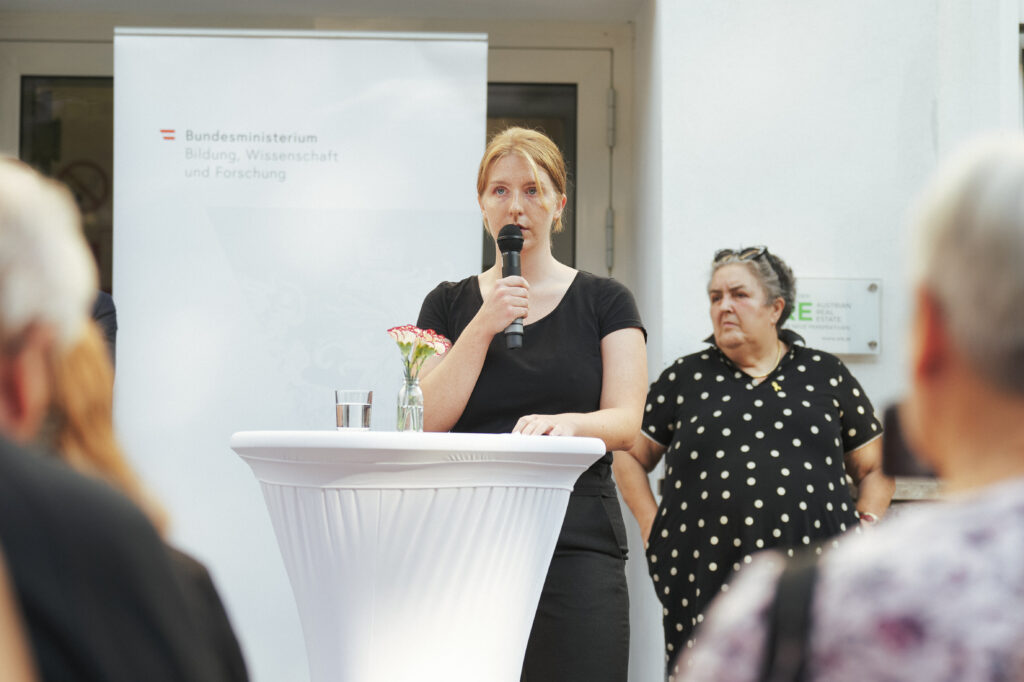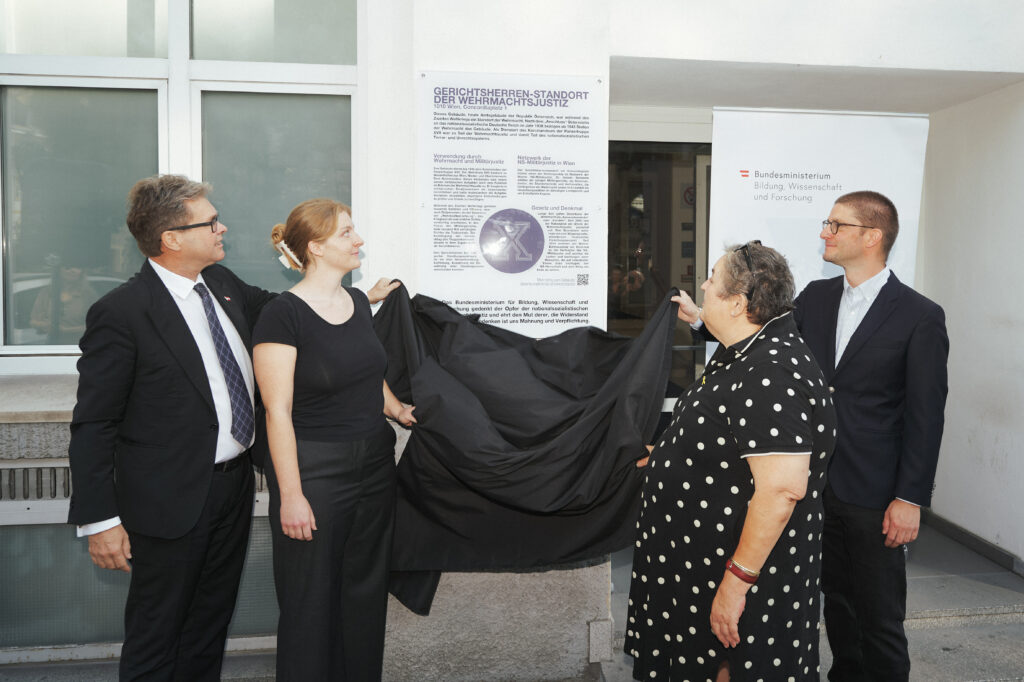The Victims Welfare Act
The Victims Welfare Act, which was passed in 1947 and amended numerous times, established narrow criteria defining who would be considered a victim of National Socialism. The lawmakers differentiated between “victims of the struggle”, categorized as “active” actors, and “passive” “victims of political persecution.” The former had to prove that they had fought for “an independent and democratic Austria, conscious of its historic mission, and engaged in the armed fight against the ideas and aims of National Socialism in particular, or having fought against it unreservedly in word and in deed.” The “victims of political persecution” had to have “severely suffered damage for political reasons or reasons of origin, religion or nationality caused by measures carried out by a court, a government office (especially the state police) or the National Socialist Party, including its organizations”, in order to be recognized by the Victims Welfare Act. Over the years, victims could apply for compensation for prison time, benefits for deprivation of freedom, loss of income and education, and for victims’ pensions, depending on the category they were deemed to belong to. These were provided on the basis of the required official documents or victim identity cards.
Inappropriate Distinctions: “personal” and “political” motives
While the victims of Nazi military justice were not explicitly excluded from these benefits, the provisions of the Victims Welfare Act strongly curtailed their chances. A 1948 decree stated: “The offences of […] desertion and undermining the military forces cannot be classified political as such […]”, since “in such cases, ver often personal, and not political motives were the cause.” This ex post examination of conscience by the state authorities was however very questionable. For one, it was difficult to assess the motives in hindsight. Karl Lauterbach, for example, did not mention his involvement in the communist underground before the court martial. Furthermore, this provision ignored the fact that crimes such as desertion and “undermining the military force” were considered highly political by the Nazi state in all cases and accordingly punished particularly harshly. Victim welfare files show that without an official confirmation from one of the political parties, it was practically impossible to prove political motives; this put religious conscientious objectors at a significant disadvantage. Only in 2005 were the victims of Nazi military justice included in the group of people eligible for victim welfare (Nazi Repeal Act). The Second Republic only recognized the inherently criminal dimension of Nazi military justice with its Repeal and Rehabilitation Act of 2009; only from that point on were insubordinate soldiers considered victims of the Nazi regime, regardless of their motives.
Scarce Acknowledgment of Deserters
A little less than 4 percent of all victims of National Socialism (those persecuted themselves and their surviving dependents) who applied for recognition and respective benefits had been persecuted for military offenses, mostly desertion. They had by far received the most death sentences and their actions were stigmatized particularly harshly. On the other hand, it was especially difficult for deserters to gain recognition as victims of Nazi persecution from the social security authorities: their applications were turned down at a disproportionally high level compared to other victim groups. In cases of sentences for “undermining the military force”, the authorities frequently distinguished between “undermining” statements and acts of resistance, such as self-mutilation. In case of the latter, the petitioner had a relatively slim chance of being granted victim benefits. Crimes such as high treason, military treason and “aiding the enemy” resulted in a higher ratio of benefits awarded, since the authorities often acknowledged the political motives of these actions and recognized them as resistance against the Nazi regime.
Prison Terms Not Counted Towards Pensions
The practice of granting benefits to victims of Nazi military justice according to the social security law (e.g., retirement benefits) have not yet been researched. On principle, however, soldiers convicted by a military court could not have their time in prison, in an internment camp or a concentration camp counted towards his pension. Following the “duty fulfillment discourse”, obedient soldiers were given preferential treatment, while deserters and other persecuted soldiers were at a disadvantage – even though around the year 2000, the Ministry of Social Affairs, at the time led by the Freedom Party of Austria (FPÖ), still claimed that the German Wehrmacht should be considered a “foreign army”. Until 2009, the Austrian state’s basic stand on desertion was that it continued to constitute a criminal offense, making an across-the-board rehabilitation of this crime impossible.
Recognition by the National Fund
The Austrian legislature established the National Fund of the Republic of Austria for Victims of National Socialism in 1995 in order to facilitate the rehabilitation of hitherto “forgotten victims” (homosexuals, Sinti and Roma, survivors and relatives of victims of “euthanasia” etc.). Yet the victims of Nazi military justice were once again omitted from the list of those eligible for rehabilitation – at first, they only stood a chance of being recognized if they could simultaneously demonstrate persecution by civilian courts (e.g. for high treason). The committee entrusted with conferring benefits also failed to recognize the inherent injustice of persecution under Nazi military law, particularly in its early years. At the time, it was common practice for the committee to distinguish between political motives, which were worthy of recognition, on the one hand, and “personal” motives on the other. This changed in favor of the petitioners around the turn of the millennium, and in the last one and a half decades, all of the XXX applications submitted have been approved. It needs to be emphasized, however, that while many petitioners were persecuted under military law, they were recognized as victims on other grounds, such as religious (conscientious objectors) or political (deserters who became partisans).
Too Late for Many
Many victims of Nazi military justice did not live see their recognition under the Victims’ Welfare Act of 2005 – those who were able to submit their applications had to frequently endure a long bureaucratic process. This is illustrated by the example of David Holzer, whose story you can read below. In 2016, the Federal Ministry of Labor, Social Affairs and Consumer Protection stated upon request that only seven applications were processed between 2005 and 2010; three were granted, three were turned down. One petitioner died during the review process.
Literature
Karin Berger; Nikolaus Dimmel; David Forster; Claudia Spring; Heinrich Berger: Vollzugspraxis des „Opferfürsorgegesetzes“. Analyse der praktischen Vollziehung des einschlägigen Sozialrechts, Wien / München 2004.
Brigitte Bailer-Galanda: Wiedergutmachung kein Thema. Österreich und ide Opfer des Nationalsozialismus, Wien 1993.
David Forster: Die Opfer der NS-Militärgerichtsbarkeit und die Zweite Republik. Fürsorge und Entschädigung. In: Manoschek, Walter (Hg.): Opfer der NS-Militärjustiz. Urteilspraxis – Strafvollzug – Entschädigungspolitik in Österreich, Wien 2003, S. 651-703.
David Forster: Die Zweite Republik und die Wehrmachtsdeserteure. Fürsorge und Entschädigung für Opfer der NS-Militärjustiz. In: Pirker, Peter; Wenninger (Hg.): Wehrmachtsjustiz. Kontext, Praxis, Nachwirkungen, Wien 2010, S. 242-254.
Hannes Metzler: Ehrlos für immer? Die Rehabilitierung der Wehrmachtsdeserteure in Deutschland und Österreich, Wien 2007.
Moos, Reinhard: Die juristische Rehabilitierung der Opfer der NS-Militärjustiz. In: Kohlhofer, Reinhard; Moos, Reinhard (Hg.): Österreischische Opfer der NS—Militärgerichtsbarkeit – Rehabilitierung und Entschädigung, Wien 2003, S. 65-90.








